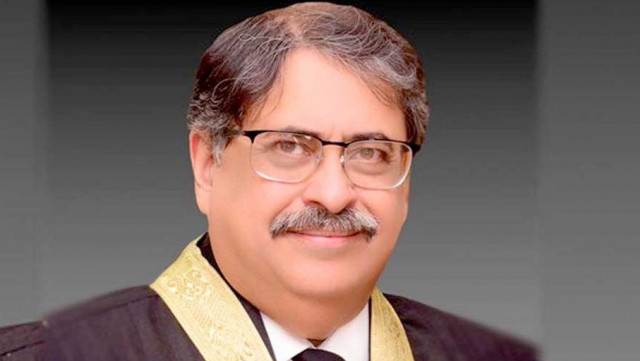Minallah questions judges’ hiring process
SC justice declares CJs power to initiate names for appointment judges ultra vires the Constitution

Supreme Court judge Athar Minallah has declared that chief justices’ power to initiate names for appointment of judges to high courts and the apex court is ultra vires the Constitution.
"Pursuant to powers conferred under Article 175-A (4), the [Judicial Commission of Pakistan] has made the Rules of 2010 to regulate its procedure,” noted Justice Minallah in relation to the commission — the JCP — that has a key role in elevation and appointment of judges to the superior judiciary.
Rule 3, he added, confers powers on the chief justices, as the case may be, to initiate nominations in the JCP but the commission does not have prescribed objective criteria in this regard.
“The initiation of nominations relates to identifying eligible persons to be considered by the commission. This is the most crucial stage because it deprives the commission of exercising its inherent duty of identification of the eligible candidates.
“Rule 3 creates a bottleneck by allowing the chief justices to regulate the entire process and that too in the absence of predetermined objective criteria.
“The commission contravenes the terms of its powers and fails in pursuing the objective for which they have been conferred. Rule 3, therefore, is ultra vires Article 175A of the Constitution," the judge noted.
A three-member SC bench led by Justice Munib Akhtar and comprising Justice Sayyed M Mazahar Ali Akbar Naqvi and Justice Athar Minallah had heard the federal government's petition against a verdict of the Peshawar High Court (PHC) in a case related to appointment of judges to the high court.
The PHC had set aside the decision of the Parliamentary Committee on Judges Appointment and ordered the government to implement the JCP’s recommendation regarding appointment of three additional judges to the PHC.
The SC bench by majority of 2 to 1 rejected the federal government petition and upheld the PHC verdict.
"There is no indication in the decision of [Parliamentary] Committee that any independent vetting was done by [it] with regard to the antecedents, character, and integrity [of the judges]…
“Instead the Committee relied entirely on the pre-discussion and deliberation of the members of the Commission [JCP] made prior to finalizing the recommendations.
“The committee’s act of remanding the matter to the [JCP] for reconsideration was not only against the command and mandate of Article 175A of the Constitution, but also transgression of the enabling rules and the hierarchy identified and demarcated for the functioning of the [JCP] and Committee.
“Hence, in our view, the learned High Court [PHC] rightly set aside the decision of the Committee," said the majority judgment authored by Justice Naqvi.
Justice Athar Minallah, however, took exception to the majority verdict and wrote a 36-page dissenting note, highlighting the flaws in the process of judges’ hiring.
The SC judge noted that the Parliamentary Committee on Judge Appointment and the JCP are forums created by the Constitution to perform a public duty: to appoint each judge on merit.
"They are not adversaries and no one is superior to the other. Both have been created to perform a duty of paramount public importance that has consequences for every citizen and their rights and freedoms.
“This duty can only be performed in accordance with the intent of the framers of the Constitution and mutual respect by both forums for each other.
“The objective for which the power has been conferred on the [JCP] is to identify, evaluate and then decide to make a nomination for each vacancy on merit.”
He said the public confidence cannot be reposed in the JCP merely because of its composition; rather it depends on the transparency and credibility of its proceedings.
"The [Parliamentary] Committee is worthy of respect because of its unique representative character. Its role as a forum of democratic accountability and oversight is because it represents the stakeholders of the judicial organ of the state; the society and the litigant."
Justice Minallah noted that the additional attorney general had rightly pointed out during arguments that the time has come to revisit the jurisprudence laid down in the Munir Bhatti case.
"The judgment is binding on this bench but with profound respect and reverence it seems that proper assistance was not extended. This court ought to recognize the unique representative character of the Parliamentary Committee and its role as a forum created for democratic accountability and oversight.
"It represents the litigants and the people, who are the sole stakeholders of the judicial organ of the state. It is their interest that is of paramount importance because they suffer when an appointment is not made on merit.
"The mode of appointment, exclusively controlled and regulated by the judges, particularly by the Chief Justice[s], has eroded the independence of the judiciary as has been evident from its historical role.”
The SC judge noted that a deeply entrenched institutional culture that does not value independent judges enables the power wielding judicial hierarchy to flout merit if the process is not transparent.
"In such an eventuality, the system loses its capability to ensure that the judges are appointed on merit, ie, the best amongst the eligible persons.
“The independence of judiciary, therefore, can only be secured, advanced and protected when the process of appointment of judges at each stage is so transparent and free from unfettered discretionary powers exercised by individuals that each appointment is seen by a reasonable observer without a legitimate doubt to have been made on merit."
He said despite being a creation of the Constitution, the Supreme Court had repeatedly validated acts of high treason and had allowed the legitimized usurpers to tamper with its provisions.
The governance of the country, the judge added, under the authoritarian and oppressive regimes, pursuant to abrogation or subversion of the Constitution for most of its history would not have been possible without the collaboration of the judiciary, particularly this court.
“The dissolution of the Majlis-e-Shoora (Parliament) by the president under Article 58(2)(b), rather than being resisted, was endorsed by this court.
“The chosen representatives fell prey to the mischief under Article 62(1)(f) and many were disqualified for life even for such trivial errors as omission to declare details of an expired identity card. Three elected prime ministers and scores of chosen representatives were disqualified."
He noted that the appointment of judges of the high court during the legitimized rule of Field Marshal Ayub Khan was subject to the latter's satisfaction obtained pursuant to interviewing the candidates.
"There is no jurisprudence of this court that would reflect friction between the judicial consultees and the validated authoritarian regimes over appointment of judges of constitutional courts.
“There is also no jurisprudence to suggest that the judicial branch during such periods may have had legitimate apprehensions regarding erosion or undermining of the independence of the judiciary because of the significant role of the validated authoritarian executive".
He said a deposed elected prime minister was sent to the gallows and questions were later raised regarding the impartiality and independence of the judiciary, so much so that a Supreme Court judge also publicly supported the perception.
"The chosen representatives were held guilty and sentenced under the law of contempt because of their speech but restraint was exercised against the powerful undemocratic forces even when the contemptuous acts were grave in nature."
Justice Minallah pointed out that extraordinary restraint was also displayed when the Area Commander of Multan, during the second martial law, issued a notice to two serving judges of the Lahore High Court to show cause why proceedings should not be taken against them for “contempt of Martial Law”.
He said a few judges who showed courage by upholding their independence and rendering verdicts according to their conscience were subjected to being prosecuted by their fellow judges merely because the powerful forces were displeased with the judgments.
Justice Minallah said the lawyers’ movement of 2007 had aimed at ensuring that the Constitution was upheld and supremacy of parliament was respected but the judicial activism and the jurisprudence developed after restoration of judges did not appear to be consistent with the movement’s stated aims.
“Some of the jurisprudence of this court may also give the appearance of being inconsistent with democratic values, eg, observations supporting Article 58(2)(b)14 or relating to the parliamentary form of government," he added.



















COMMENTS
Comments are moderated and generally will be posted if they are on-topic and not abusive.
For more information, please see our Comments FAQ